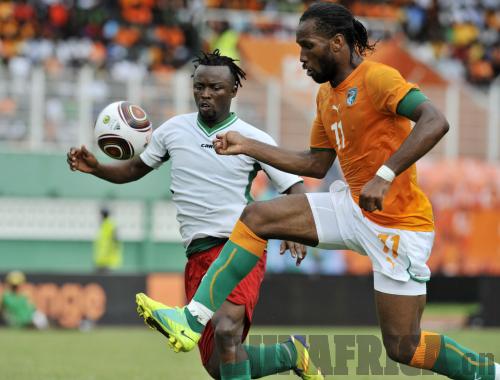|
 |
|
THE BEAUTIFUL GAME: Ivorian Didier Drogba battles for the ball against Burundi in a CAN 2012 qualifier in Abidjan |
The Africa Cup of Nations, officially CAN (French for Coupe d'Afrique des Nations), for long has become an industry that catalyzes development but also contributes to stabilize social unrests in Africa.
In 1957 the first Africa Cup of Nations was held in Sudan, and since then the football tournament has become much more than just a sporting event. Today it contributes to African development as well as integrating of peoples.
In 2012, Gabon and Equatorial Guinea co-hosted the tournament. It is 40 years since Central Africa hosted the last tournament in Cameroon in 1972.
In 1957, the leaders of the Confederation of African Football (CAF) at the time started this continental competition with four teams, increasing since to 16 teams from 1996.
Teams that qualified for the 28th CAN are Mali, Guinea, Zambia, Libya, Morocco, Senegal, Burkina Faso, Niger, Cote d'Ivoire, Ghana, Sudan, Angola, Botswana, Tunisia, and the two host countries, which were exempt from qualifying. African football heavyweights Cameroon, Egypt, Nigeria and South Africa were conspicuous by their absence.
Big business
The Africa Cup of Nations tournament has gone beyond sport to become big business and boost development.
The 40,000 plus seater Stade de l'Amitié-Sino-Gabonaise, home to the CAN final, was built by the Shanghai Construction Group. Henri Ohayon, General Director of the National Agency of Major Construction (ANGT), said it was "a gift from the Chinese Government to Gabon in the name of friendship that ties the two countries."
Created in February 2010 in partnership with American engineering company Bechtel, ANGT is responsible for the infrastructural projects for CAN 2012. Currently benefiting from good oil prices, Gabon is believed to have invested $494 million for the CAN through the ANGT, according to the africareport.com
Ohayon said that the CAN event was just a small part of a major national renovation project costing more than $10 billion.
"With housing projects, roads, hospitals, hotels and schools to be built around the stadiums, the nation will continue to benefit from the values of the tournament in the future," he said.
Both Gabonese and foreign companies have reaped the rewards from building CAN infrastructure, with Socoba, a major Gabonese construction company, working alongside foreign companies like Colas and Ramez, said africareport.com
The website reported that the massive investments have stimulated growth, which has risen from minus 1.4 percent in 2009, to 5.5 percent 2010, and should reach 4.2 percent in 2011. According to the African Development Bank, growth is expected to reach 4.8 percent in 2012.
|